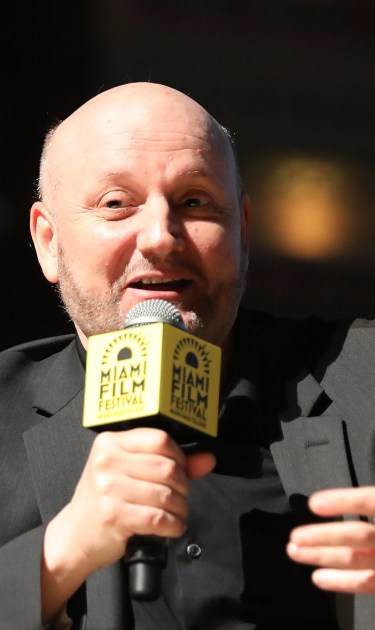Nostalgia for movies “como las de antes” plagued the mind of Argentine director Juan José Campanella for the last 20 years. That’s how long it took him to develop his latest retro feature El cuento de las comadrejas (The Weasels’ Tale). In both content and form, the movie pays homage to Ernst Lubitsch and Billy Wilder’s classic comedies from the Golden Age of Hollywood.
“I love movies with ingenious dialogue that make you envy the characters’ cleverness,” he told Remezcla at the Miami Film Festival where he was honored prior to a screening of the film. Sharply humorous, The Weasels’ Tale follows four retired friends, all of whom once made a living in show business, as they try to prevent legendary actress Mara (Graciela Borges) from selling her home to opportunistic vultures.
Based on one of Campanella’s favorite dramedies, Los muchachos de antes no usaban arsénico (Yesterday’s Guys Used No Arsenic) by his mentor José Martínez Suárez, The Weasels’ Tale allowed him to evoke stylistic elements from the past without these seeming unrealistic in a modern context. He made a story set in the present with elderly characters exuding mannerisms from a bygone era. His intent was to create the type of work that no longer gets made, but he misses dearly.
“As an audience member when I go to the movies today I don’t have as much fun as I used to 20 or 30 years ago. Comedies today don’t have the witty dialogue or clever twists like the ones that I grew up watching did,” he said. “I’ve lost the enjoyment of going to the movie theater a bit because I’m not interested in most of the movies being made today.”
It’s been a decade since Campanella’s El secreto de sus ojos (The Secret in Their Eyes) won the Oscar for Best Foreign Language Film. In the years that followed, there were several offers for him to make a new feature in Hollywood — he’d previously directed three films in the U.S. — but he was focused on his foosball-centered animated feature Metegol (Underdogs). That venture meant setting up an entire animation studio in Argentina called Mundo Loco.

“I love that animation gives you the possibility to get out of reality. Animation turns fantasy into reality. It’s like poetry in that sense. Like [Jorge Luis] Borges would say, the mere act of putting short phrases one below the other already takes the content outside of the demands of prose,” he shared. “That’s why I love animation, because it’s so liberating for creativity.”
A fan of emblematic independent animators such as Bill Plympton and Jan Švankmajer, he embarked on a yearslong undertaking to produce a CG animated adventure for $30 million with mostly Argentine and Spanish artists, that would have cost over $150 million if made by an American studio. But while Metegol did well theatrically across Latin America and the world, its U.S. release by The Weinstein Company was delayed for multiple factors, including the death of producer Jorge Estrada Mora, but not a specific conflict — Campanella claims.
“Harvey Weinstein bought Metegol for U.S. distribution, and he made many edits and changes to the movie that I didn’t like. It was clear when he bought it that he could make changes, like he did with Il Postino and other movies, but the changes he made didn’t make the movie better. I love the original movie,” he explained. “Ultimately it didn’t play in theaters in the U.S. and premiered on Netflix, but I never found out how it did there because Netflix doesn’t release any numbers.” The film is no longer available to stream there.

Though he loves the art form, he admittedly won’t direct another animated feature any time soon given that the slow process doesn’t fit his work rhythm. Instead, he’s currently focusing his time on building a theater in Buenos Aires and is currently writing a new screenplay with his The Secret in Their Eyes co-writer Eduardo Sacheri.
In regard to the 2015 English-language remake of The Secret in Their Eyes released, which was subpar both financially and critically, Campanella believes the key obstacle for the creators was adapting a film that won the Academy Award just a few years prior. Negative comparisons abounded. He foretells that a Parasite remake may face a similar uphill battle if done too soon, because it’s too fresh in people’s minds.
Critical recognition and acclaim haven’t dictated his career. He prefers the popular approval of awards voted by hundreds or thousands of people, like the Oscars, to those chosen by a select group of individuals, as it’s often the case at festivals. Audience awards are Campanella’s favorites, but he knows that just receiving one doesn’t guarantee industry longevity. Sometimes the most deserving artists don’t triumph.
“Awards help the movies financially. I’m sure Parasite’s numbers surged after the win. But my favorite American movies didn’t win any Oscars: All That Jazz, Singing in the Rain, It’s a Wonderful Life, and all of Lubitsch’s comedies, which are masterpieces,” he explained. “There are incredibly illustrious directors who never won, so on a personal level awards are mostly a pat on the back. It’s better to win them than not to lose them.”
Outsider Pictures will release The Weasels’ Tale in theaters later this year.




